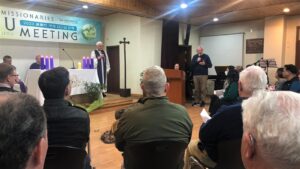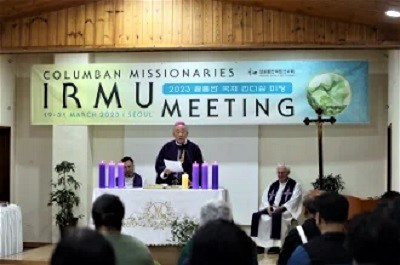Bishop Job Koo Yobi of Seoul Archdiocese paid tribute to the Columbans in his homily at Mass on Sunday 19 March 2023 which marked the opening of the Missionary Society of St Columban’s Interregional/Mission Unit (IRMU) meeting in Korea.
In his homily, Bishop Yobi, who has responsibility for religious and missionaries in Seoul Archdiocese, said the Society had helped “reveal God’s wondrous work”.
He thanked the representatives from the 16 countries where Columban priests, lay missionaries and co-workers work for the Society’s dedicated service in Korea over the past 90 years to evangelisation and mission work, enabling the faith of the Korean Catholics to grow in maturity.
The Missionary Society of St Columban first entered Korea in the 1930s. Seven Columbans were killed while on mission in Korea during the Korean War of 1950-1953.
 Full text of Bishop Job Koo Yobi’s address:
Full text of Bishop Job Koo Yobi’s address:
It is a great joy and an honour for me to celebrate this Mass with Fr Tim Mulroy, the Leader of the Society of St Columban, with the leaders from each region and mission unit, and with all the Columbans and friends who are gathered here. Praise and thanks to God!
The Missionary Society of St Columban first entered Korea in the 1930s. I thank you very much for your dedicated service over the past 90 years to evangelisation and mission work, enabling the faith of the Korean Catholics to grow in maturity.
Especially in the 1960s, when Korean society began to develop economically and the rural population moved to the capital city Seoul, the number of Catholics in Seoul Archdiocese increased rapidly and the number of local priests was small. As the number of local priests increased in the 1980s, the Columbans willingly handed over the parishes you built and the communities of Catholics that you formed with love.
And you began to develop new diverse apostolates to the socially disadvantaged, to whom the Church has a mission of care. These included the worker apostolate, the urban poor apostolate, Alcoholics Anonymous, Gamblers Anonymous, Marriage Encounter and opening spiritual psychology counselling centres.
Personally, in my 10 years of seminary training in the 1970s, all three of my parish priests were Columbans (Frs Sean Brazil, John Smyth and Patrick Conway). I was preparing to be a priest and they guided me, sometimes strictly, but thoughtfully and with love. In particular, I will say that the formation happened naturally as I saw their pastoral approach respecting the Korean Catholics as persons, listening attentively to them, not being authoritarian and caring lovingly for people in need.
I was born during the Korean War and baptised by Fr (Gong Toma) Thomas Comerford. I was impressed by meeting this priest for the first time at my ordination ceremony in 1981. He was a priest who prayed, a priest with prayer deeply embedded in his face and body!
After that, I respected him a lot, and when Father was fighting cancer in his old age, I often visited him and made my confession. On one occasion, I went with Fr Comerford on a picnic to my brother’s house in my hometown. The priest recalled the names of the believers he had visited in the our village chapel over 50 years ago and he wondered how they were.
He wanted to see them and so he went out to find the villages and houses where those Catholics had lived in the past. I heard that Fr Comerford wrote a personal diary every day while living as a missionary all his life in Korea, and that the record is still extant.
In his later years, when he was pastor in the outstation chapel of Ildong in Chuncheon Diocese, I visited him with some Catholics. I was both surprised and in awe to discover that he had purchased and distributed to every Catholic a copy of the thick ‘Catholic Catechism Book’, and that he himself taught them doctrine.
In Fr Thomas’s appearance and life, I met a priest who resembles Jesus, the good shepherd. In Chuncheon diocese, Gangwon-do, the most marginalised province in Korea, I saw the features of a true missionary in this priest. He was the loving shepherd who was a pastor to the poor rural believers for more than 60 years.
I heard that your meeting, which starts today, is a “preparation meeting for the General Assembly in 2024.” Currently, the Universal Synod of Bishops is conducting a synod meeting under the theme of ‘The Church Living the Spirit of Synod.’ The spirituality of ‘Synodalitas,’ the mindset of the synod, is a spiritual legacy of faith that has already been experienced and passed down within the Church’s history, especially within various monastic societies.
The spirituality of this ‘Synodalitas’ should be experienced particularly in General Assemblies of Religious and Missionary Congregations and should be the driving force that directs the General Assembly. The surprising “newness” discovered by the Korean Church during the synod journey of the past year and six months I think has been “listening to the voice of the Holy Spirit” in Church meetings and gatherings.
In the mystery of the Trinity, the dominant characteristic of the Holy Spirit is the immanent nature of God in people, in history, and the world. The Holy Spirit is the love of God that exists and works in the human heart, in human history, in all things that exist in the world.
The Holy Spirit, which overcame death and rose from the dead, is now the life of Christ active in all humans, in history and in the world. When we live in the Holy Spirit, with the guidance of the Holy Spirit, we can be children of the Light (Ephesians 5).
As missionaries – living and working in other peoples’ languages, history, traditions and cultures – the mission is above all about discovering the seeds of God’s Word alive in the hearts, the lives and the history of the people of the country to which we are sent, and helping this life of God to sprout, grow, and blossom. Like Jesus in the Gospel today, no matter the situation of the person entrusted to us, our task is to help reveal God’s wondrous work in that person.
“We must do the works of the One who sent me while it is still day” (John 9, 3-4).
In this modern society, the task demanded of missionaries, as individuals or as a community, is above all to have a faith sensitive to the Word of God as we live with the people we meet, and in the presence and activity of the Holy Spirit alive in this world.
To quote Pope Benedict XVI: “The word of God makes us change our concept of realism: the realist is the one who recognises in the word of God the foundation of all things.” (Benedict XVI, Verbum Domini, #10).
Courtesy: Independent Catholic News – https://www.indcatholicnews.com/


